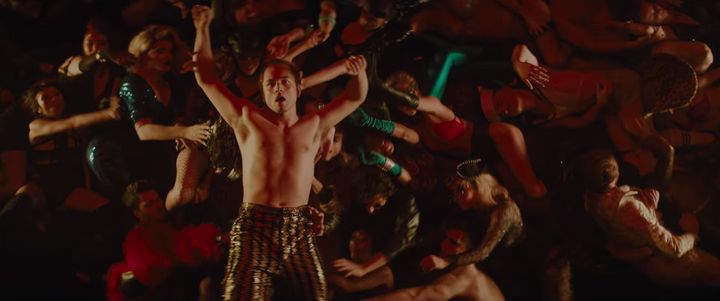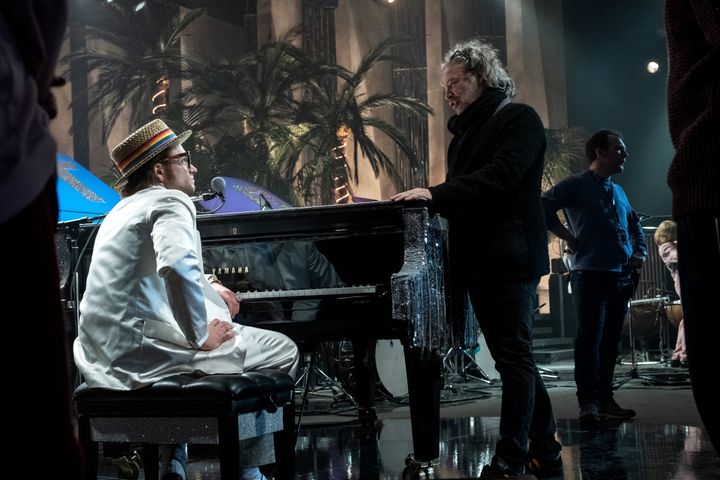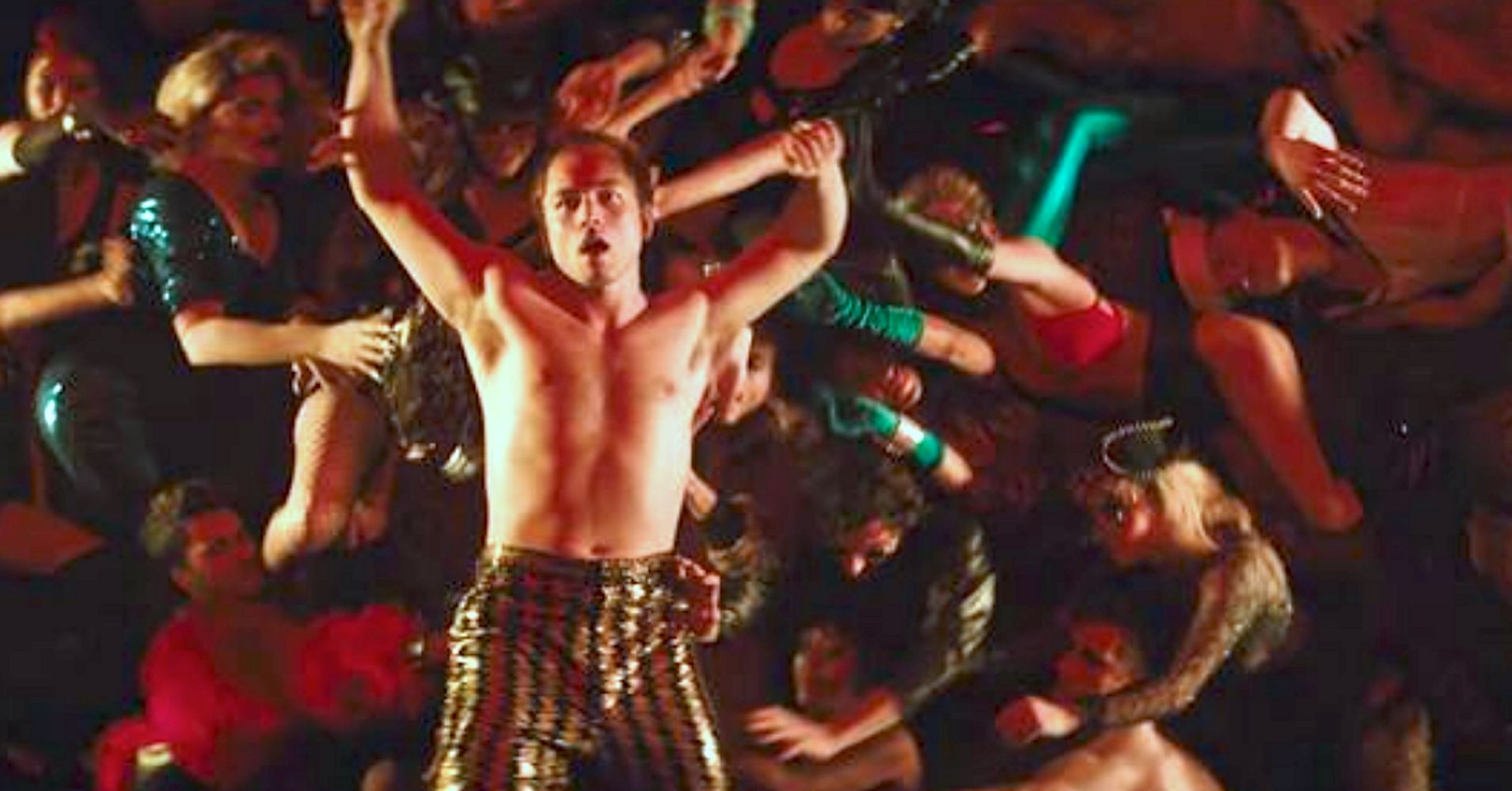[ad_1]
As one would expect from a movie about Elton John, “Rocketman” peaks during its musical sequences. There’s the downcast family singalong set to “I Want Love,” the perky carnival boogie set to “Saturday Night’s Alright for Fighting,” the surreal tavern performance set to “Crocodile Rock” and the lonesome party vignette set to “Tiny Dancer” ― all captured with a dazzling verve that pushes past rock-and-roll biopic clichés to emphasize the texture of John’s songs.
The best of these scenes is the quasi-orgy scored by “Bennie and the Jets,” during which Elton (Taron Egerton) floats atop a sea of horny bodies sprawled across a nightclub floor, the camera tracking him from overhead. It’s a short, sensual reverie evoking “Across the Universe,” “Moulin Rouge!” and this year’s psychedelic dance freakout “Climax.” But in a curious twist, the moment almost got axed, until David Furnish, John’s husband who produced “Rocketman,” encouraged director Dexter Fletcher to leave it in.

The “Bennie and the Jets” rhapsody arrives about two-thirds of the way into the movie. By then, Elton has become a chart-topping superstar caught between the lingering pain of his cold-hearted childhood and the epicurean trappings of fame. Addicted to booze, drugs, sex and money, he is operating on autopilot, lost in the music industry’s decadence. Actualizing that excess, Elton finds himself drifting through a dim London discotheque in a coked-out daze. Erotic bliss surrounds him, but he is numb to it all. With a naked torso and shimmery gold pants, Elton bodysurfs through clubgoers writhing on the ground as “Bennie” thumps along. When he reaches the crowd’s end, he is placed on a bed perched on a stage, shrouded in a haunting spotlight.
The scene Fletcher filmed ― as drafted in the script, written by Lee Hall (“Billy Elliot,” “War Horse”) ― was longer than the one we now see. After Elton landed on the bed, men sprayed Champagne on his chest and hoisted him into the air, turning a metaphorical orgy into a more literal one.
Upon glimpsing it during the editing process, Fletcher felt the imagery lacked a certain poignancy. The out-and-out carnality “diluted” what he hoped to convey about Elton’s psyche. He insists there was no nudity, perhaps anticipating speculation that Paramount Pictures executives censored the footage, as they reportedly considered doing for a rump-bearing scene that finds John in bed with his manager (Richard Madden). Still, something didn’t click.
“It was really beautiful and kind of balletic what went on there, but it didn’t communicate what I wanted it to,” Fletcher said. “It became really good to look at, but what’s it really saying?”
Unsure how to change it, he considered nixing it altogether. But that would have been a heartbreak: Drawing inspiration from Studio 54 and cabaret venues, the “Rocketman” crew spent three days tirelessly constructing the nightclub, including a staircase leading to the stage, in an old English post office. The scene required dozens of extras, some scantily clad and others donning fantastical Eltonesque garments. Two were even recruited by Fletcher himself.

“There were a couple of guys I had met in a clothes store who were really beautiful and I said, ‘You want to be in a movie?’ They came and they were great,” he said. “Everyone just sort of crawled and rolled and slid on the floor, and they just carried Taron across and onto the bed. It becomes a little Hieronymus Bosch.”
In swooped Furnish with the wisdom Fletcher needed to hear. This was a key point in Elton’s evolution, he said ― a moment when the performer would realize he is relying on substances and sex to compensate for the affection his parents denied him while young. The things that should be fun about Elton’s life are mere drudgery. Singing and playing the piano liberated him, but the accompanying renown underscored his demons. He’d need rehab to shake them.
Using Furnish’s advice, Fletcher trimmed the segment and interspersed it with fleeting visions from Elton’s youth, exactly what the singer was pining to escape. Suddenly it gained a tension that had been missing, positing a divide between the shy, self-loathing Elton and the one who masks his turmoil in showboating theatrics.
“Elton had reached a point where he was kind of on self-destruct, almost,” Fletcher said. “There was kind of this shallow attempt to throw himself into a lot of meaningless one-night stands that he would access through this crazy, hedonistic world. I wanted to create that, but I didn’t want it to be gratuitous and just be that for that’s sake.”
Even sans Champagne, “Bennie and the Jets” is a glittering parade of lasciviousness, with Egerton’s torso and Elton’s gay desires the main attraction. Considering how tentative Hollywood remains when it comes to depicting queer lust, it’s also a refreshing aesthetic for a mainstream studio release expected to appeal to all demographics. The recent biopic “Bohemian Rhapsody,” for example, seemed to shame Freddie Mercury for his sexuality, as if being attracted to men was the Queen frontman’s tragic flaw. It nonetheless became a runaway blockbuster and won Rami Malek an Oscar. Fletcher clearly learned a thing or four about how to better honor a gay pop star, having stepped in for “Bohemian” director Bryan Singer, whom 20th Century Fox fired with only two weeks left in the production. (Due to union regulations, Singer retained sole credit.) “Rocketman” is a vastly superior film in every regard.
A key distinction: Its subject is satisfied too.
“I think Elton is completely enamored of it, as much as myself,” Fletcher said. “I hope so. He’s never said anything to me but wonderfully complimentary things about any of the film. He said to me, ‘It’s the film I wanted to be made,’ so I can’t get a better compliment than that.”
“Rocketman” is now in theaters.
REAL LIFE. REAL NEWS. REAL VOICES.
Help us tell more of the stories that matter from voices that too often remain unheard.
[ad_2]
Source link

